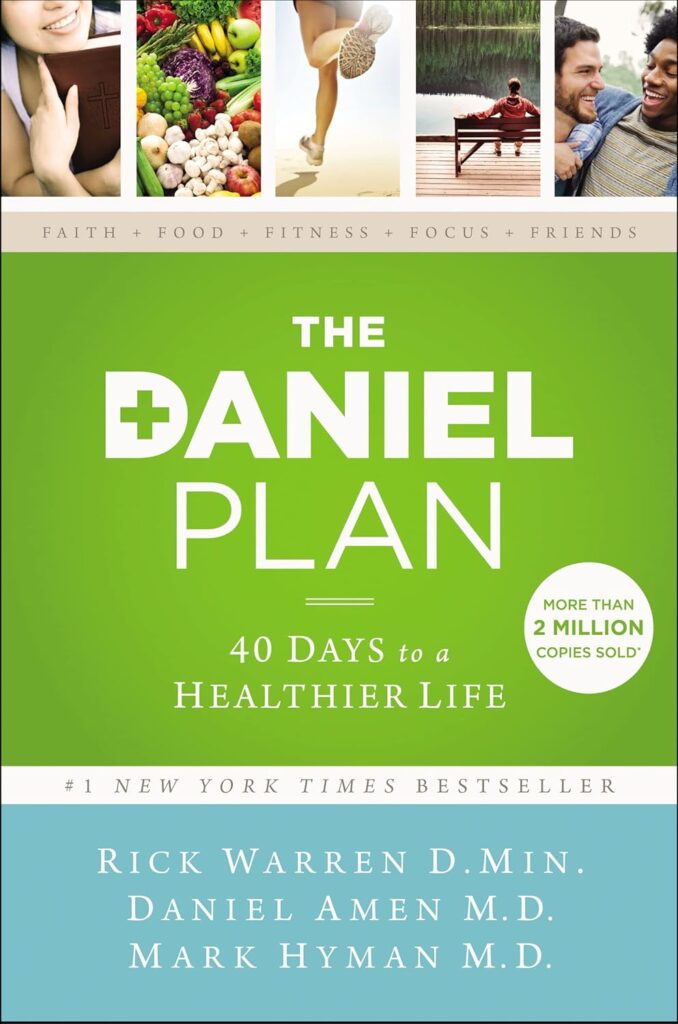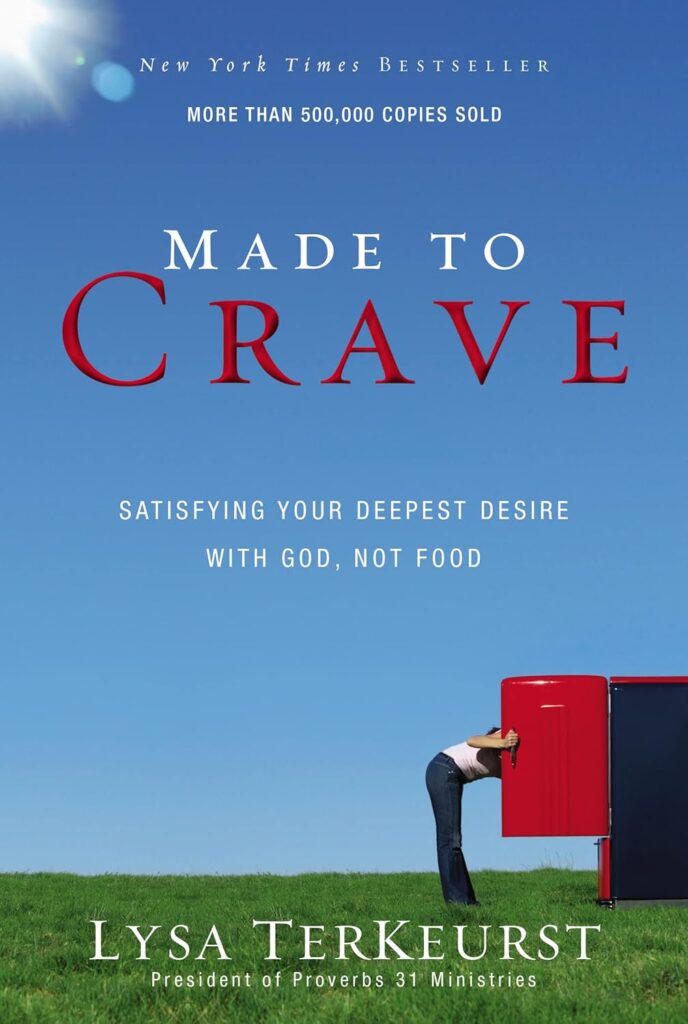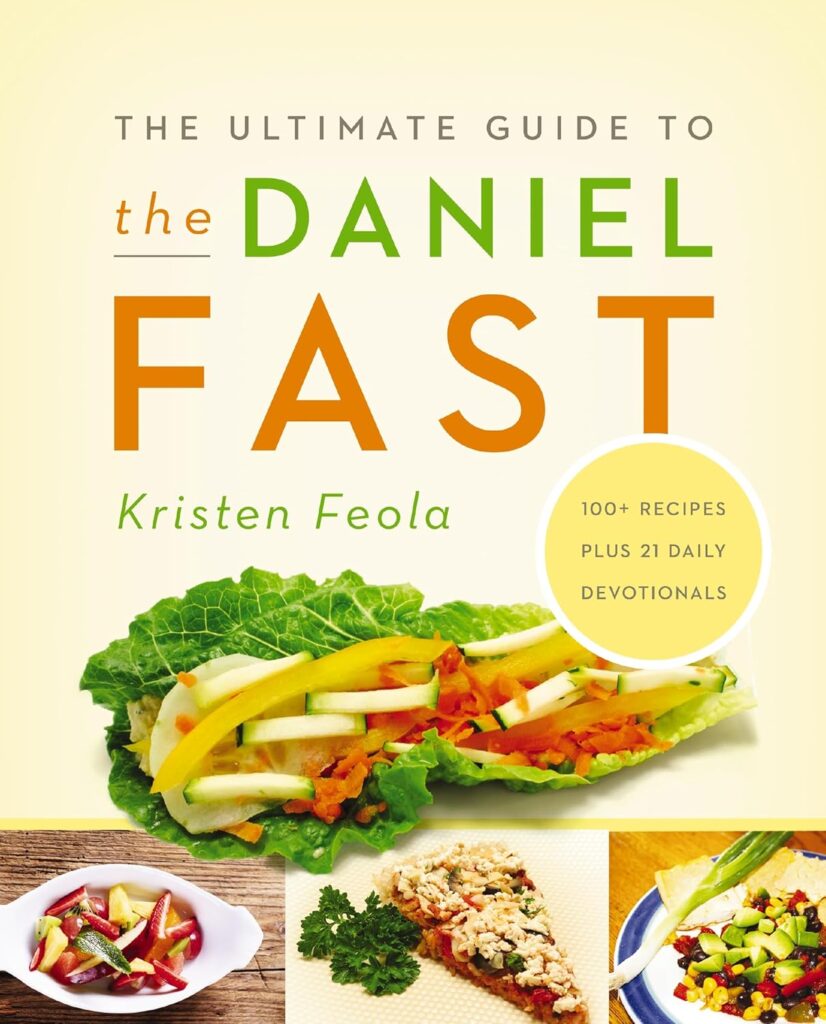Finding the right weight loss program can be challenging, especially if you’re looking for an approach that aligns with your faith. That’s where Christian weight loss programs come in—they not only focus on improving your physical health but also nurture your spiritual well-being.
These programs incorporate biblical principles, prayer, and a supportive faith-based community to help you stay motivated and committed. In this article, we’ll explore the top 10 Christian weight loss programs designed to inspire transformation from the inside out, offering practical tools and spiritual guidance for a healthier, more balanced life.
Just a heads-up: This post contains affiliate links, which means if you click and make a purchase, I may earn a small commission—at no extra cost to you. I only recommend programs I genuinely believe can help support your faith and wellness journey.
Now, let’s explore the top Christian weight loss programs designed to inspire both body and soul!
1. The Daniel Plan
The Daniel Plan takes a comprehensive approach to health, inspired by the biblical prophet Daniel. Participants engage in Bible studies, group support sessions, and practical health education to transform their lives holistically.
The program’s 40-day challenge serves as a catalyst for change, but it’s principles are designed for long-term lifestyle transformation.
The Daniel Plan integrates prayer and scripture with nutritional guidance and fitness routines. This approach helps participants view their health journey as an act of worship, aligning their physical goals with their spiritual values.
By addressing all aspects of wellness – physical, emotional, and spiritual – The Daniel Plan offers a truly holistic approach to fat loss and health.
The program provides a wealth of resources, including books, cookbooks, and online tools, to support participants throughout their journey. These materials offer practical advice on meal planning, exercise routines, and spiritual disciplines that complement the program’s core principles.
One of the strengths of The Daniel Plan is it’s emphasis on community support. Participants are encouraged to form small groups or “Daniel Plan Circles” where they can share experiences, offer encouragement, and hold each other accountable.
This social aspect enhances the program’s effectiveness and fosters lasting friendships and spiritual connections.
The nutritional component of The Daniel Plan focuses on eating whole, unprocessed foods. Participants learn to prepare meals that are both nourishing and delicious, emphasizing fruits, vegetables, lean proteins, and healthy fats.
The program also addresses common nutritional pitfalls and provides strategies for overcoming cravings and emotional eating.
Fitness is another key component of The Daniel Plan. The program encourages regular physical activity, not just for fat loss, but as a way to honor God with our bodies.
Exercise recommendations are tailored to person fitness levels and preferences, making it accessible to people of all ages and abilities.
Perhaps most importantly, The Daniel Plan emphasizes the spiritual aspect of health and wellness. Participants are encouraged to deepen their relationship with God through prayer, Bible study, and meditation.
This spiritual foundation provides motivation and strength for the physical changes participants are working to achieve.
2. Weigh Down Workshop
Gwen Shamblin’s Weigh Down Workshop takes a unique approach to fat loss by focusing primarily on the spiritual aspects of overeating. Rather than prescribing strict diets or exercise regimens, this program teaches participants to rely on God’s strength to overcome food addiction and emotional eating.
The core principle of Weigh Down is learning to listen to your body’s natural hunger cues and finding fulfillment in God as opposed to food. Through Bible study, prayer, and group support, participants learn to identify the root causes of their overeating and develop a healthier relationship with food.
Weigh Down Workshop stands out because of it’s emphasis on addressing the heart issues behind weight struggles. By focusing on spiritual transformation, many participants find that physical changes naturally follow.
The program offers online classes, support groups, and resources to help people break free from the cycle of yo-yo dieting and find lasting freedom in their relationship with food.
One of the key teachings of Weigh Down Workshop is the concept of “hunger and fullness.” Participants are encouraged to eat only when they experience true, physical hunger and to stop eating when they feel satisfied, not overly full. This approach helps break the habit of eating for emotional reasons or out of boredom.
The program also emphasizes the importance of surrendering food-related struggles to God. Participants learn to turn to prayer and scripture when faced with temptation, as opposed to relying on willpower alone.
This spiritual focus helps many people find a sense of peace and freedom around food that they may have never experienced before.
Weigh Down Workshop includes a variety of resources to support participants on their journey. These include books, workbooks, audio teachings, and video series.
The program can be done individually or in a group setting, with many churches offering Weigh Down classes as part of their ministry offerings.
One of the unique aspects of Weigh Down Workshop is it’s rejection of traditional diet culture. The program doesn’t promote specific food restrictions or exercise regimens.
Instead, it encourages participants to eat whatever they want, but only in amounts that their bodies truly need. This approach can be liberating for those who have struggled with restrictive diets in the past.
Critics of the program have raised concerns about it’s intense focus on spiritual aspects at the expense of medical and nutritional guidance. However, many participants report significant fat loss and improved relationships with food through following the Weigh Down principles.
3. First Place 4 Health
First Place 4 Health is a Christ-centered weight-loss and healthy living program that has been helping people achieve balance in their lives for over 30 years. This comprehensive approach addresses four key areas: mental, emotional, physical, and spiritual health.
Participants engage in weekly Bible studies, memorize Scripture, and learn practical strategies for healthy eating and regular exercise. First Place 4 Health emphasizes small group support and accountability.
Members meet regularly to share their struggles, celebrate victories, and encourage one another in their health journeys.
The program offers a wide range of resources, including cookbooks, fitness videos, and devotionals, to support long-term success. By addressing all aspects of a person’s life, First Place 4 Health helps participants create lasting change that goes beyond just losing weight.
One of the program’s strengths is it’s flexibility. It can be implemented in churches, community centers, or even in small home groups.
This adaptability makes it accessible to a wide range of people, regardless of their location or circumstances.
The nutritional component of First Place 4 Health is based on sound, scientific principles. Participants learn about balanced eating, portion control, and the importance of staying hydrated. The program provides meal plans and recipes that are both nutritious and satisfying, making it easier for members to stick to their health goals.
Physical activity is another key aspect of First Place 4 Health. The program encourages regular exercise, not just for fat loss, but for overall health and well-being.
Participants are encouraged to find forms of physical activity that they enjoy, making it more likely that they’ll stick with their fitness routines long-term.
The spiritual component of First Place 4 Health is woven throughout the program. Weekly Bible studies help participants connect their health goals with their faith, providing motivation and encouragement.
Scripture memorization is also emphasized, giving members powerful tools to combat negative thoughts and temptations.
One unique aspect of First Place 4 Health is it’s focus on mental and emotional well-being. The program recognizes that lasting change needs addressing not just physical habits, and thought patterns and emotional triggers.
Participants learn strategies for managing stress, overcoming negative self-talk, and developing a positive body image.
The community aspect of First Place 4 Health is a significant factor in it’s success. Small groups provide a supportive environment where members can share their struggles and victories.
This accountability and encouragement can be crucial in maintaining motivation and overcoming obstacles.
First Place 4 Health also offers leadership training for those who want to start groups in their own communities. This multiplies the program’s impact, allowing more people to benefit from it’s comprehensive approach to health and wellness.
4. Made to Crave
While not a traditional fat loss program, Lysa TerKeurst’s Made to Crave provides a powerful spiritual foundation for those seeking to overcome food struggles. This book and accompanying resources help women (though men can benefit too) understand that their cravings for food often mask a deeper hunger for God.
Made to Crave offers biblical insights, personal stories, and practical tips for replacing food fixation with a stronger relationship with God. Participants learn to view their health journey as a spiritual battle, equipping themselves with Scripture and prayer to overcome temptation and find satisfaction in Christ alone.
Made to Crave focuses on the emotional and spiritual aspects of overeating. Rather than providing a diet plan, it addresses the underlying issues that often lead to unhealthy eating habits.
By helping readers identify and address these root causes, Made to Crave sets the stage for lasting change.
The program includes a book, study guide, and video series, making it suitable for both personal study and group settings. Many churches have adopted Made to Crave as a women’s ministry resource, creating supportive communities for those on their health journey.
One of the key principles of Made to Crave is the idea that our bodies are designed to crave. TerKeurst argues that this craving instinct is not inherently bad, but that it’s often misdirected towards food instead of God.
The program helps participants redirect their cravings towards spiritual fulfillment, leading to a healthier relationship with both food and faith.
Made to Crave doesn’t prescribe specific dietary rules or exercise regimens. Instead, it encourages participants to make empowered choices based on their person health needs and goals.
The focus is on developing a mindset of honoring God with food choices, as opposed to following a set of restrictive rules.
The program addresses common struggles such as emotional eating, using food as a reward, and the cycle of guilt and shame that often accompanies overeating. TerKeurst shares her own experiences with these issues, creating a sense of empathy and understanding that many participants find comforting and motivating.
Scripture plays a central role in Made to Crave. Participants learn to use Bible verses as tools for overcoming temptation and finding strength in moments of weakness.
This approach helps combine faith into the daily decisions surrounding food and health.
One unique aspect of Made to Crave is it’s focus on identity. The program challenges participants to see themselves as God sees them, as opposed to defining themselves by their weight or eating habits.
This shift in perspective can be transformative for many who have struggled with body image issues.
Made to Crave also addresses the importance of community in the health journey. While the program can be done individually, it encourages participants to find accountability partners or join small groups for support and encouragement.
5. Body and Soul Fitness
Body and Soul Fitness offers Christ-centered fitness classes that mix effective workouts with uplifting Christian music and Scripture. This program recognizes that physical health and spiritual well-being are interconnected, providing a unique exercise experience that nourishes both body and soul.
Classes range from high-intensity cardio to strength training and dance, all set to contemporary Christian music. Instructors incorporate brief devotionals and Scripture readings into the workouts, creating an atmosphere of worship through movement.
Body and Soul Fitness turns exercise into a form of spiritual expression. Participants improve their physical health and grow in their faith as they move and sweat to God-honoring music.
The program offers both in-person and online classes, making it accessible to people regardless of their location.
Instructors are certified and trained to provide safe, effective workouts while maintaining a focus on spiritual growth.
One of the unique aspects of Body and Soul Fitness is it’s use of Christian music. Each workout is carefully choreographed to contemporary Christian songs, with movements that often reflect the lyrics.
This creates a powerful connection between physical movement and spiritual worship, making exercise feel more meaningful and enjoyable for many participants.
The program offers a variety of class types to suit different fitness levels and preferences. These include high-energy cardio classes, strength training sessions, dance-based workouts, and lower-impact options for people who have physical limitations.
This diversity confirms that there’s something for everyone, regardless of age, fitness level, or exercise experience.
Body and Soul Fitness places a strong emphasis on community. Classes are designed to foster a sense of camaraderie among participants, with instructors encouraging interaction and mutual support.
Many participants find that these classes become not just a workout, but a place of fellowship and spiritual growth.
The spiritual component of Body and Soul Fitness is woven throughout each class. Instructors often begin sessions with a brief devotional or Scripture reading, setting a spiritual tone for the workout.
Throughout the class, they may offer words of encouragement or spiritual insights that relate to the physical challenges of the workout.
One of the program’s strengths is it’s focus on holistic health. While the workouts are designed to improve physical fitness, the spiritual and emotional benefits are equally emphasized. Participants often report feeling uplifted, encouraged, and spiritually refreshed after classes, in addition to the physical benefits of exercise.
Body and Soul Fitness also offers training for those who want to become instructors. This training covers the physical aspects of leading fitness classes and emphasizes the spiritual components that make the program unique.
This allows the program to expand and reach more communities, multiplying it’s impact.
The program has adapted to changing times by offering online classes and resources. This has made Body and Soul Fitness accessible to people who may not have a local class available or who prefer to work out from home.
These online options maintain the same focus on combining physical fitness with spiritual growth.
6. Christian Yoga
While some Christians debate the appropriateness of yoga, several programs have adapted the physical benefits of yoga poses into a Christ-centered practice. These Christian yoga programs, often called “Holy Yoga” or “Yahweh Yoga,” mix gentle stretching and strength-building poses with Scripture meditation, prayer, and worship music.
Participants learn to use their bodies as instruments of praise while improving flexibility, balance, and core strength. These classes often incorporate breathing exercises and relaxation techniques that help reduce stress and promote overall well-being, all within a biblical framework.
Christian yoga changes a traditionally Eastern practice into a form of Christian worship and meditation. Instructors carefully choose poses and modify traditional yoga language to align with Christian beliefs and values.
Many practitioners find that Christian yoga helps them connect with God in a new and profound way, using their bodies as a means of worship and prayer.
This mind-body-spirit approach can be particularly useful for those who struggle with stress, anxiety, or body image issues.
One of the key aspects of Christian yoga is the integration of Scripture into the practice. Instructors often choose a Bible verse or theme for each class, weaving it throughout the session.
Poses may be paired with specific verses or spiritual concepts, helping participants meditate on God’s word as they move through the practice.
Christian yoga classes typically begin and end with prayer, setting a spiritual tone for the practice. Throughout the session, instructors may offer words of encouragement or spiritual insights, helping participants connect their physical movements with their faith.
The physical benefits of Christian yoga are similar to those of traditional yoga. Participants can expect to improve flexibility, strength, and balance.
The practice also promotes better posture and body awareness.
Many find that regular practice helps reduce chronic pain and improves overall physical well-being.
Christian yoga also emphasizes the mental and emotional benefits of the practice. The combination of physical movement, controlled breathing, and spiritual focus can be a powerful tool for managing stress and anxiety.
Many participants report feeling more calm, centered, and connected to God after a Christian yoga session.
One unique aspect of Christian yoga is it’s focus on using the body as an instrument of worship. Participants are encouraged to view their practice as a way of honoring God with their bodies, in line with the biblical concept of the body as a temple of the Holy Spirit.
Christian yoga classes are often designed to be accessible to people of all fitness levels. Instructors typically offer modifications for each pose, allowing participants to adjust the practice to their person needs and abilities.
This inclusivity makes Christian yoga a good option for those who may be intimidated by more intense forms of exercise.
Many Christian yoga programs offer teacher training for those who want to lead classes in their own communities. This training covers both the physical aspects of yoga instruction and the spiritual components that make Christian yoga unique.
This has allowed the practice to spread, with classes now available in many churches and Christian community centers.
7. Thin Within
Thin Within is a non-diet approach to fat loss that focuses on intuitive eating guided by biblical principles. This program teaches participants to eat only when truly hungry and stop when satisfied, breaking the cycle of emotional eating and food obsession.
Thin Within emphasizes finding your worth in Christ as opposed to in appearance or weight. Through Bible study, journaling exercises, and group support, members learn to identify and address the spiritual and emotional roots of their eating habits.
Thin Within takes a grace-filled approach to health. The program encourages freedom from food rules and diet culture while honoring God with our bodies.
By focusing on internal cues as opposed to external restrictions, participants often find a more peaceful and sustainable relationship with food.
The program offers books, workbooks, and online resources to guide participants through their journey. Many churches and small groups have adopted Thin Within as a ministry, creating supportive communities for those seeking freedom from food struggles.
One of the core principles of Thin Within is the concept of “hunger and satisfaction.” Participants learn to recognize true, physical hunger and to eat only in response to this hunger. They’re also taught to stop eating when they feel comfortably satisfied, as opposed to overly full.
This approach helps break the habit of eating for emotional reasons or out of boredom.
Thin Within places a strong emphasis on addressing the spiritual and emotional aspects of overeating. The program encourages participants to turn to God, as opposed to food, for comfort, stress relief, and emotional support.
Through Bible study and prayer, members learn to find their worth and satisfaction in Christ, as opposed to in food or body image.
The program also addresses the issue of food addiction. Thin Within teaches that freedom from food obsession is possible through reliance on God’s strength and grace.
Participants learn to identify trigger foods and situations, and develop strategies for overcoming temptation that are rooted in their faith.
One unique aspect of Thin Within is it’s rejection of traditional dieting methods. The program doesn’t prescribe specific meal plans or forbidden foods.
Instead, it encourages participants to eat whatever they truly desire, but only in amounts that their bodies need. This approach can be liberating for those who have struggled with restrictive diets in the past.
Thin Within also addresses body image issues from a biblical perspective. The program teaches that our worth comes from being created in God’s image, not from our appearance or weight.
This can be healing for many who have struggled with body dissatisfaction and low self-esteem.
The community aspect of Thin Within is a significant factor in it’s success. Many participants find that sharing their struggles and victories with others who understand is crucial to their progress.
The program encourages the formation of support groups, either in-person or online, to provide this important element of community.
8. The Lord’s Table
The Lord’s Table, developed by Setting Captives Free, is an online Christian fat loss course that addresses the heart issues behind overeating and food addiction. This intensive 60-day program combines daily Bible study, accountability, and practical assignments to help participants find freedom from food bondage.
The course emphasizes the gospel message, teaching that true satisfaction comes from a relationship with Christ as opposed to food. Participants learn to “feast on God’s Word” instead of overindulging in physical food, leading to both spiritual growth and natural fat loss.
The Lord’s Table intensely focuses on spiritual transformation as the key to physical change. The program doesn’t shy away from addressing sin and idolatry related to food, encouraging participants to find their identity and satisfaction in Christ alone.
The online format of The Lord’s Table makes it accessible to people worldwide. Participants receive daily lessons, have access to mentors, and can connect with others in the program for support and accountability.
One of the unique aspects of The Lord’s Table is it’s structured, day-by-day approach. Over the course of 60 days, participants work through a series of lessons that progressively address different aspects of their relationship with food and with God.
This structured approach helps confirm that participants thoroughly examine and address their eating habits and underlying spiritual issues.
The program places a strong emphasis on Scripture study and memorization. Participants are encouraged to spend time daily in God’s Word, with specific passages and themes related to food, self-control, and finding satisfaction in Christ.
This focus on Scripture helps participants renew their minds and change their thought patterns around food.
The Lord’s Table also incorporates practical assignments to help participants apply what they’re learning. These might include keeping a food journal, practicing delayed gratification, or reaching out to encourage another participant.
These hands-on elements help bridge the gap between spiritual insights and real-life change.
One of the strengths of The Lord’s Table is it’s emphasis on accountability. Participants are assigned a mentor who provides support, encouragement, and accountability throughout the program.
This one-on-one interaction can be crucial for those struggling with deep-seated food issues.
The program addresses not just overeating, but a range of unhealthy behaviors related to food, including restriction, purging, and obsessive thoughts about weight and body image. This comprehensive approach recognizes that food issues can manifest in various ways and aims to bring all aspects of eating under the lordship of Christ.
While The Lord’s Table doesn’t prescribe specific dietary rules, it does encourage participants to make wise, God-honoring choices about food. The program teaches principles of healthy eating without becoming legalistic, emphasizing freedom in Christ as opposed to rigid restrictions.
The Lord’s Table also recognizes the importance of physical activity, not just for fat loss, but as a way of stewarding the body God has given. Participants are encouraged to incorporate regular exercise into their routines, viewing it as an act of worship as opposed to punishment.
9. Faith and Fitness Magazine
While not a structured program, Faith and Fitness Magazine offers a wealth of resources for Christians seeking to improve their health. This online platform provides articles, workout plans, and nutritional advice, all from a biblical perspective.
Readers can find inspiration for integrating their faith into their fitness routines and making God-honoring choices in their diet and lifestyle. The magazine covers topics ranging from Christian athletes’ testimonies to faith-based approaches to common health issues.
Faith and Fitness Magazine provides ongoing, up-to-date content that addresses current trends and issues in health and fitness from a Christian perspective. It serves as an excellent supplementary resource for those following other Christian fat loss programs or for people looking for continuous motivation in their health journey.
The magazine also features success stories from readers, providing real-life examples of how faith can be a powerful motivator in achieving health goals. This community aspect can be particularly encouraging for those who may feel alone in their struggles with weight and health.
One of the strengths of Faith and Fitness Magazine is it’s diverse range of topics. Articles cover everything from nutrition and exercise to mental health and spiritual growth, all through a Christian lens.
This holistic approach recognizes that true wellness involves caring for the whole person – body, mind, and spirit.
The magazine regularly features interviews with Christian fitness professionals, athletes, and health experts. These interviews provide readers with insights and advice from those who are successfully integrating their faith with their fitness pursuits.
This can be particularly inspiring for readers who are looking for role models in their own health journeys.
Faith and Fitness Magazine also offers practical workout plans and exercise tips. These are often designed to be accessible to people of various fitness levels, making it easier for readers to incorporate physical activity into their daily lives.
The workouts are often accompanied by spiritual reflections or Scripture, helping readers view their exercise time as an opportunity for spiritual growth as well.
Nutrition is another key focus of the magazine. Articles often explore how to make healthy eating choices that honor God and nourish the body He has given us.
This might include discussions on mindful eating, the benefits of whole foods, or how to navigate social situations while maintaining healthy habits.
The magazine also addresses mental and emotional health from a Christian perspective. Articles might explore topics such as overcoming negative body image, managing stress through faith-based practices, or finding motivation for health goals in Scripture.
This recognition of the mind-body-spirit connection sets Faith and Fitness Magazine apart from secular health publications.
One unique aspect of Faith and Fitness Magazine is it’s exploration of how different spiritual disciplines can support physical health. For example, articles might talk about how fasting can be incorporated into a healthy lifestyle, or how the discipline of Sabbath rest can contribute to overall wellness.
The magazine often features content related to family health and fitness. This might include tips for encouraging healthy habits in children, ideas for active family outings, or advice on how couples can support each other’s health goals.
This family focus recognizes that health and faith are often shared journeys.
Faith and Fitness Magazine also serves as a platform for community building. Through reader comments, social media engagement, and featured reader stories, the magazine fosters a sense of connection among Christians who are passionate about health and fitness.
This community aspect can be a source of encouragement and accountability for many readers.
10. Daniel Fast
The Daniel Fast is a 21-day partial fasting program based on the experiences of the prophet Daniel in the Bible. While primarily used as a spiritual discipline, many people experience fat loss and improved health as a side effect of this biblically-inspired eating plan.
During the fast, participants consume only fruits, vegetables, whole grains, nuts, seeds, and water. The program encourages prayer, Bible study, and spiritual reflection alongside the dietary changes.
The Daniel Fast focuses on spiritual growth as opposed to fat loss. However, the clean eating approach often leads to improved health and natural fat loss.
Many participants report increased energy, better sleep, and a clearer mind in addition to spiritual benefits.
While not designed explicitly for fat loss, the Daniel Fast can jumpstart healthier eating habits and deepen your spiritual life, often leading to a more balanced approach to food and health. Many churches organize group Daniel Fasts, providing community support and shared spiritual experiences.
The Daniel Fast is typically undertaken for a period of 21 days, although some people choose to extend or shorten this time based on personal or spiritual goals. The specific duration is often chosen to align with the biblical account of Daniel’s three-week period of prayer and fasting.
One of the key aspects of the Daniel Fast is it’s focus on whole, plant-based foods. Participants are encouraged to consume a variety of fruits, vegetables, whole grains, nuts, and seeds. This emphasis on nutrient-dense, unprocessed foods often leads to improved digestion, increased energy levels, and better overall health.
The fast eliminates all animal products, including meat, dairy, and eggs. It also excludes processed foods, sugar, alcohol, and caffeine.
While this can be challenging for some, many participants find that they develop a new appreciation for the natural flavors of whole foods during the fast.
Water is the primary beverage during the Daniel Fast, although some variations allow for unsweetened plant-based milk choices. This focus on hydration, combined with the high water content of many fruits and vegetables, often leads to improved skin health and increased energy levels.
While fat loss is not the primary goal of the Daniel Fast, many participants do experience a reduction in body weight and body fat percentage. This is likely because of the elimination of processed foods and the increased consumption of high-fiber, nutrient-dense plant foods.
The spiritual component of the Daniel Fast is equally important as the dietary aspect. Participants are encouraged to use the time they would normally spend on food preparation or eating to engage in prayer, Bible study, and spiritual reflection.
Many people find that the physical discipline of the fast enhances their spiritual focus and receptivity.
Many churches and Christian organizations provide resources to support those undertaking a Daniel Fast. These might include daily devotionals, prayer guides, or suggested Scripture readings that align with the themes of fasting and spiritual growth.
The Daniel Fast can also be a powerful community-building experience when undertaken as a group. Many churches organize group fasts, providing opportunities for shared prayer, discussion, and mutual encouragement.
This communal aspect can enhance the spiritual impact of the fast and provide accountability for those who might struggle with the dietary restrictions.
While the Daniel Fast is generally considered safe for most healthy adults, it’s important for people with specific health conditions or dietary needs to ask with a healthcare provider before beginning the fast. Some people may need to modify the fast to confirm they’re meeting their nutritional needs.
Many participants find that the Daniel Fast leads to lasting changes in their eating habits and spiritual practices. The experience of eliminating processed foods and focusing on whole, plant-based options often inspires people to maintain a healthier diet even after the fast ends.
Similarly, the increased focus on prayer and spiritual disciplines during the fast often leads to more consistent spiritual practices in the long term.
Frequently Asked Questions
What is a Christian fat loss program?
A Christian fat loss program combines biblical principles with practical health strategies to help people achieve a healthier body while growing in their faith. These programs often include elements of prayer, Bible study, and spiritual reflection alongside nutritional guidance and fitness recommendations.
How do Christian fat loss programs differ from secular ones?
Christian fat loss programs combine faith elements into the fat loss journey. They often emphasize finding worth in God as opposed to appearance, use Scripture for motivation, and view caring for your body as an act of worship.
Secular programs typically focus solely on diet and exercise without the spiritual component.
Are Christian fat loss programs effective?
Many people find Christian fat loss programs effective because they address not just physical health, and emotional and spiritual well-being. The added dimension of faith can provide motivation, support, and a sense of purpose that some find lacking in purely secular approaches.
Can non-Christians join in these programs?
While these programs are designed with Christian beliefs in mind, many are open to non-Christians who are comfortable with the faith-based elements. Some non-Christians find value in the holistic approach and supportive community these programs offer.
Do Christian fat loss programs promote specific diets?
This varies by program. Some, like the Daniel Plan, recommend specific eating patterns, while others, like Thin Within, focus more on intuitive eating guided by biblical principles.
It’s important to research each program to find one that aligns with your personal health needs and beliefs.
How do I choose the right Christian fat loss program for me?
Consider factors such as your personal health goals, spiritual needs, preferred level of structure, and available time and resources. Reading reviews, talking to past participants, and possibly trying out a few different programs can help you find the best fit.
Is fasting a common component of Christian fat loss programs?
Some Christian fat loss programs, like the Daniel Fast, incorporate elements of fasting. However, not all programs include fasting, and those that do often emphasize the spiritual aspects of fasting as opposed to using it primarily as a fat loss tool.
Can I do these programs if I’m not a member of a church?
Most of these programs can be done individually or in small groups, even without church affiliation. Many offer online resources and communities for support.
However, some programs may be most effective when done in a supportive church environment.
Do Christian fat loss programs address emotional eating?
Yes, many Christian fat loss programs recognize the role of emotional and spiritual factors in overeating. They often provide strategies for addressing these issues from a faith-based perspective.
Are there Christian fat loss programs specifically for men or women?
While many programs are designed for both men and women, some, like Made to Crave, are geared more towards women. It’s worth researching to find a program that resonates with your specific needs and experiences.
Key Takeaways
- Christian fat loss programs offer a unique approach by integrating faith principles with health and wellness strategies.
- These programs often address not just physical health, and emotional and spiritual well-being.
- Many Christian fat loss programs emphasize community support and accountability.
- The spiritual focus of these programs can provide additional motivation and a sense of purpose in the fat loss journey.
- While approaches vary, most of these programs encourage viewing the body as a temple of the Holy Spirit and caring for it as an act of worship.
- Many participants find that these programs lead to lasting lifestyle changes that go beyond just fat loss.
- It’s important to choose a program that aligns with your personal health needs, spiritual beliefs, and lifestyle.
- While designed for Christians, many of these programs can be useful for anyone open to a faith-based approach to health and wellness.
- These programs often provide a wide range of resources, from books and online tools to in-person support groups.
- The holistic approach of Christian fat loss programs can lead to improvements in overall quality of life, not just physical health.







